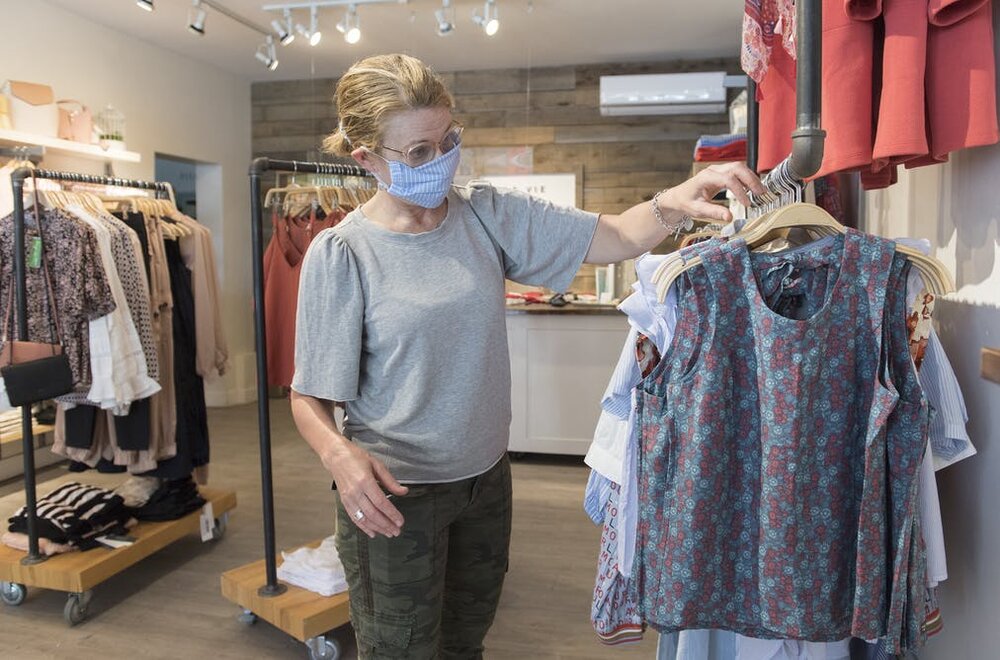
By M. Tina Dacin and Laura Rees
A small business has been given the green light to reopen amid the COVID-19 pandemic. What does it need to consider for employees and customers?
Small business owners are reorganizing physical space to account for continued distancing requirements and rethinking supply chains to deliver products and services in new ways to meet changing demand patterns.
But they must not forget the hearts and minds of employees and customers.
That doesn’t mean replacing a focus on the bottom line, but it helps address the need for a new set of expectations and ways of communicating in terms of product or service offerings, delivery methods and real-time feedback.
Based on our expertise in organizational behaviour and past research we’ve conducted, we provide a set of recommendations to help small businesses thrive in our new COVID-19 economy by looking after the hearts and minds of the people most important to businesses — employees and customers.
Fear, Anxiety
One of the biggest outcomes of living amid the COVID pandemic is the fear, anger, sadness and vulnerability many people are feeling. Even very loyal customers may have suddenly short fuses when a favourite product or service is delayed.
Both old and new customers may feel hesitant to enter shops or restaurants, unsure of how to engage with employees safely and afraid of unknowingly getting infected or infecting others.
Employees, although likely relieved to be able to earn a pay cheque, may have similar fears, and wonder how to control potentially unsafe situations or customers who aren’t adhering to social distancing protocols.
Overall, engaging the hearts and mind of both employees and customers means recognizing that they’re probably feeling emotions differently than they were before COVID-19. In particular, they may experience more ambivalence — a mix of emotions that can feel uncomfortable or even alien — as they grapple with discovering, experimenting and understanding what a “new normal” means.

Owner Rosanna Petan wears a face shield and Jack Willis wears a face mask as she cuts his hair at Frank’s Barbershop, in Vancouver, on May 19, 2020. photo: THE CANADIAN PRESS/Darryl Dyck
Research shows this kind of emotional complexity can lead to a host of outcomes, including vacillation, disengagement and even paralysis — at least partly explaining why employees and customers may seem like deer in headlights during the first days of a business reopening.
Yet our previous research shows that ambivalence can actually be helpful, increasing people’s problem-solving abilities by opening their thinking to alternative perspectives.
Redirecting Emotions
That means rather than avoiding ambivalence because it feels uncomfortable, small businesses must help their employees redirect these feelings into brainstorming creative solutions for engaging customers, updating websites and soliciting and incorporating customer feedback.
Doing so will have the added benefit of helping employees and customers feel more in control over the situation — a basic human need that has been drastically reduced during the pandemic.

Grounds crew do maintenance as they prepare to open Piper’s Heath Golf Club during the COVID-19 pandemic in Milton, Ont., on May 13, 2020. photo: THE CANADIAN PRESS/Nathan Denette
Coupled with emotional complexity is the loss of beloved everyday rituals, from shaking hands to being able to stand close to help a customer decide on a haircut, new clothes or specific menu items.
As businesses reopen, addressing this loss of tradition and predictability in employees’ and customers’ minds will be crucial.
Our research on the role of rituals in institutional maintenance shows that common rituals bind people together, anchoring our sense of identity and structuring our lives in comfortable and predictable ways.
In short, rituals create the sense of normalcy that is now lost.
But to form new rituals and traditions, businesses must first re-establish trust. When trust is fragile and old rituals must be abandoned to make way for new practices, business leaders need to consider multiple approaches in how to work and interact with employees and customers.
Start a Dialogue
The first approach is to engage in dialogue.
Reopening costs do not solely pertain to sanitizing workplaces and providing personal protection equipment, but also to the amount of time it takes to discuss and address concerns.
Important questions to employees and customers include:
-
What are your concerns about being here? What can we do to make things safer?
-
What do I need to know about you that could help me work with and serve you better?
Companies should use this feedback to create new rituals and workplace norms together with employees and customers.
Customization, in fact, will be increasingly important as both employees and customers have unique needs and circumstances.

Two women have drinks on the patio of a restaurant in Vancouver, on May 19, 2020. British Columbia has begun reopening its economy. photo: THE CANADIAN PRESS/Darryl Dyck
According to local small business owner Lisa Arbo of Salon 296 in Kingston, Ont.: “A large part of success going forward will be about being sensitive to everyone’s reality.” This type of empathetic co-creation is likely to reduce uncertainty and give everyone a healthier sense of emotional and physical comfort and control.
Manage Perceptions
The second approach is to manage perceptions. Small business owners are the custodians of the trusted relationships between their companies, employees and customers.
Even as business owners adapt to this new, emotionally complex and less predictable world, their employees and customers are looking for them to communicate clearly, succinctly and often about what is both possible and not possible, and what the new expectations are at all levels of the social contract. That includes everything from physical distancing rules to standards for customer satisfaction.

People wait in a line for the cashiers, separated by their carts and a corral made of tape to allow for physical distancing, at a garden centre in Ottawa on May 23, 2020. photo: THE CANADIAN PRESS/Justin Tang
By recognizing and finding ways to incorporate employees’ and customers’ emotional complexity and sense of loss for beloved traditions, small businesses can actually make this challenging time an unexpected opportunity to thrive.
Uncertainty, change and customization are key elements of the new business reality and embracing them, while difficult, will yield success. Businesses that excel will be the ones that effectively learn to engage the hearts and minds of their employees and customers.
This article was originally published in The Conversation. Read the original article here.

M. Tina Dacin, Stephen J.R. Smith Chaired Professor of Strategy & Organizational Behavior, Queen's University, Ontario.
TODAY’S TOP HEADLINES


Laura Rees, Assistant Professor of Organizational Behaviour, Queen's University, Ontario.
from Retail Insider | RI Articles https://ift.tt/2XJ6O96
via IFTTT
Great insights on recovery strategies! Along with easing fears, businesses can learn from platforms like TigerExch 247, which prioritize user trust and security. Clear communication and reliable services build confidence in challenging times.
ReplyDelete